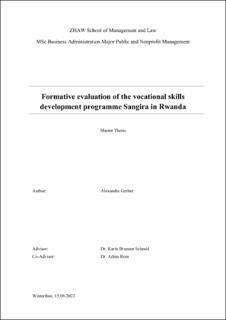Please use this identifier to cite or link to this item:
https://doi.org/10.21256/zhaw-30842| Publication type: | Master thesis |
| Title: | Formative evaluation of the vocational skills development programme Sangira in Rwanda |
| Authors: | Gerber, Alexandra |
| Advisors / Reviewers: | Brunner Schmid, Karin Rom, Adina |
| DOI: | 10.21256/zhaw-30842 |
| Extent: | 138 |
| Issue Date: | 2023 |
| Publisher / Ed. Institution: | ZHAW Zürcher Hochschule für Angewandte Wissenschaften |
| Publisher / Ed. Institution: | Winterthur |
| Language: | English |
| Subject (DDC): | 361.763: Nonprofit organization |
| Abstract: | Despite the economic progress that has followed the genocide in Rwanda in 1994, 46.5% of the population in 2021 is still living in poverty. 67% of the population is under the age of 25, and these young people account for 70% of the unemployed. This leads to poverty, low levels of education and few job opportunities, a situation exacerbated by rapid population growth and increased informal employment. Established in 2021, Sangira provides marginalised Rwandan youth in the rural area of Nyamasheke with market-relevant vocational training and internship placements in the hospitality industry to improve their employability and livelihoods. As with any programme, it is important to evaluate its efficiency, effectiveness, impact and alignment with its intended objectives. This thesis is a first step in this direction. Through a formative programme evaluation, this thesis aims to examine various aspects of the Sangira programme using a triangulation of qualitative and quantitative data collection methods in the form of a beneficiary survey, expert interviews and a field visit. The author developed and analysed Sangira’s Theory of Change, which serves as a roadmap outlining activities, expected outputs, intended outcomes, programme objectives, as well as assumptions underlying the framework. The integration of monitoring and evaluation activities aligned with the Theory of Change framework enhances the evidence-based decision-making process of the programme. To evaluate Sangira's performance, key output indicators were identified that provide measurable criteria for assessing the programme, such as enrolment rates, beneficiary satisfaction and increased beneficiary knowledge. Another critical aspect is the determination of whether the Sangira programme is adhering to its intended intervention activities. This thesis identifies gaps and areas for improvement, such as addressing school accessibility, equipment shortages or the need for more practical skills training. Research suggests that these are necessary factors for the successful implementation of vocational education training programmes. Overall, Sangira is delivering its planned activities, but would benefit from addressing the identified challenges. Understanding programme beneficiaries is another critical aspect of programme evaluation, to ensure the relevance and inclusivity of Sangira’s interventions. This thesis examines the demographic characteristics of Sangira’s beneficiaries, including their socio-economic background, employment and personal situations. Sangira reaches a group of beneficiaries with no significant gender gap, and most have completed secondary education. Consideration should be given to the high number of beneficiaries living far from the programme site, possibly through boarding facilities. By gaining insight into the beneficiary profile, Sangira can tailor its interventions to address their specific needs and challenges. This thesis also looks at beneficiary evaluations, including satisfaction with trainers, training atmosphere and personal growth, which are important in assessing programme effectiveness and overall experience. The feedback shows positive perceptions, indicating high levels of beneficiary satisfaction and willingness to recommend the programme to others. In addition, this thesis explores how beneficiaries perceive their employability at the end of the programme. Most report improvements and expressing their aspirations to pursue careers in the hospitality sector or to set up their own businesses. This thesis contributes to the literature on the evaluation of vocational training programmes in the specific context of Rwanda. Through an analysis of the beneficiary survey and the results of the expert interviews, it provides insights into areas of strength and areas for improvement. The findings highlight the contribution of Sangira in equipping beneficiaries with practical skills, promoting personal development and increasing their employability. The effectiveness of the programme can be enhanced by incorporating feedback from beneficiaries, strengthening the link between theoretical and practical skills training, and building stronger relationships with industry partners to keep up to date with labour market needs. According to various studies in the field, these are necessary conditions for a sustainable vocational training programme. At the same time, the formative evaluation highlights the need for further research to assess the long-term impact of the programme on employability and earning levels. Overall, the Sangira programme has the potential to contribute to the economic empowerment of individuals and the reduction of unemployment in Nyamasheke. |
| URI: | https://digitalcollection.zhaw.ch/handle/11475/30842 |
| License (according to publishing contract): | CC BY-NC-ND 4.0: Attribution - Non commercial - No derivatives 4.0 International |
| Departement: | School of Management and Law |
| Appears in collections: | MSc Business Administration |
Files in This Item:
| File | Description | Size | Format | |
|---|---|---|---|---|
| 2023_Gerber_Alexandra_MSc_BA.pdf | 4.65 MB | Adobe PDF |  View/Open |
Show full item record
Gerber, A. (2023). Formative evaluation of the vocational skills development programme Sangira in Rwanda [Master’s thesis, ZHAW Zürcher Hochschule für Angewandte Wissenschaften]. https://doi.org/10.21256/zhaw-30842
Gerber, A. (2023) Formative evaluation of the vocational skills development programme Sangira in Rwanda. Master’s thesis. ZHAW Zürcher Hochschule für Angewandte Wissenschaften. Available at: https://doi.org/10.21256/zhaw-30842.
A. Gerber, “Formative evaluation of the vocational skills development programme Sangira in Rwanda,” Master’s thesis, ZHAW Zürcher Hochschule für Angewandte Wissenschaften, Winterthur, 2023. doi: 10.21256/zhaw-30842.
GERBER, Alexandra, 2023. Formative evaluation of the vocational skills development programme Sangira in Rwanda. Master’s thesis. Winterthur: ZHAW Zürcher Hochschule für Angewandte Wissenschaften
Gerber, Alexandra. 2023. “Formative Evaluation of the Vocational Skills Development Programme Sangira in Rwanda.” Master’s thesis, Winterthur: ZHAW Zürcher Hochschule für Angewandte Wissenschaften. https://doi.org/10.21256/zhaw-30842.
Gerber, Alexandra. Formative Evaluation of the Vocational Skills Development Programme Sangira in Rwanda. ZHAW Zürcher Hochschule für Angewandte Wissenschaften, 2023, https://doi.org/10.21256/zhaw-30842.
Items in DSpace are protected by copyright, with all rights reserved, unless otherwise indicated.